Key takeaways
- Empiricism emphasizes that all knowledge is rooted in sensory experiences, highlighting the importance of evidence in forming beliefs.
- Hume’s distinction between impressions and ideas suggests that true understanding comes from direct, vivid experiences rather than abstract reasoning.
- Embracing curiosity and a willingness to question assumptions can foster deeper learning and personal growth, as learning is seen as an ongoing journey.
- In modern education, applying Hume’s empiricism involves using real-world experiences to enhance understanding while acknowledging the limitations of sensory knowledge.
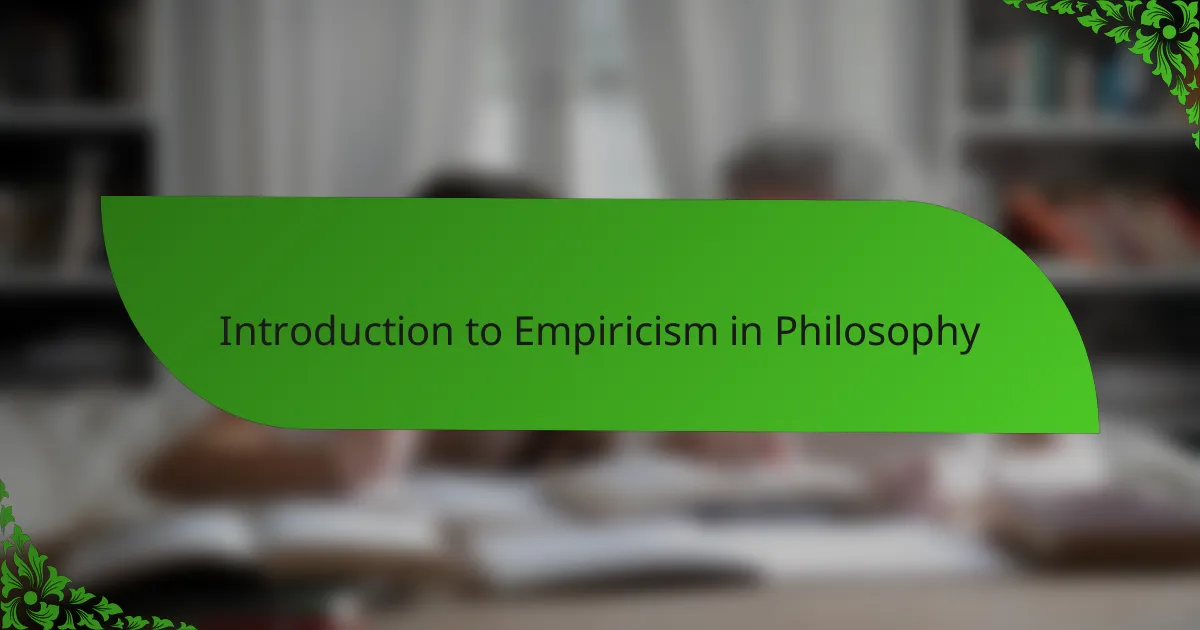
Introduction to Empiricism in Philosophy
Empiricism, at its core, is the idea that knowledge comes primarily from sensory experience. When I first encountered this concept, it struck me how naturally it fits with the way we learn as children—through seeing, touching, hearing, and experimenting with the world around us. Isn’t it fascinating how something so fundamental has shaped centuries of philosophical thought?
I often ask myself why some thinkers emphasize reason or intuition over experience, yet empiricism insists that without our senses, understanding would be impossible. This perspective feels incredibly grounded to me because it acknowledges the limits of what we can grasp and the importance of evidence in forming beliefs. Have you ever stopped to consider how much of what you “know” is actually based on direct experience versus assumption?
Experiencing philosophy through the lens of empiricism has made me appreciate the everyday moments where learning happens—when watching a sunset teaches more about color and light than any book could. It’s a reminder that philosophy isn’t just abstract; it’s deeply connected to how we navigate reality, question it, and grow wiser.
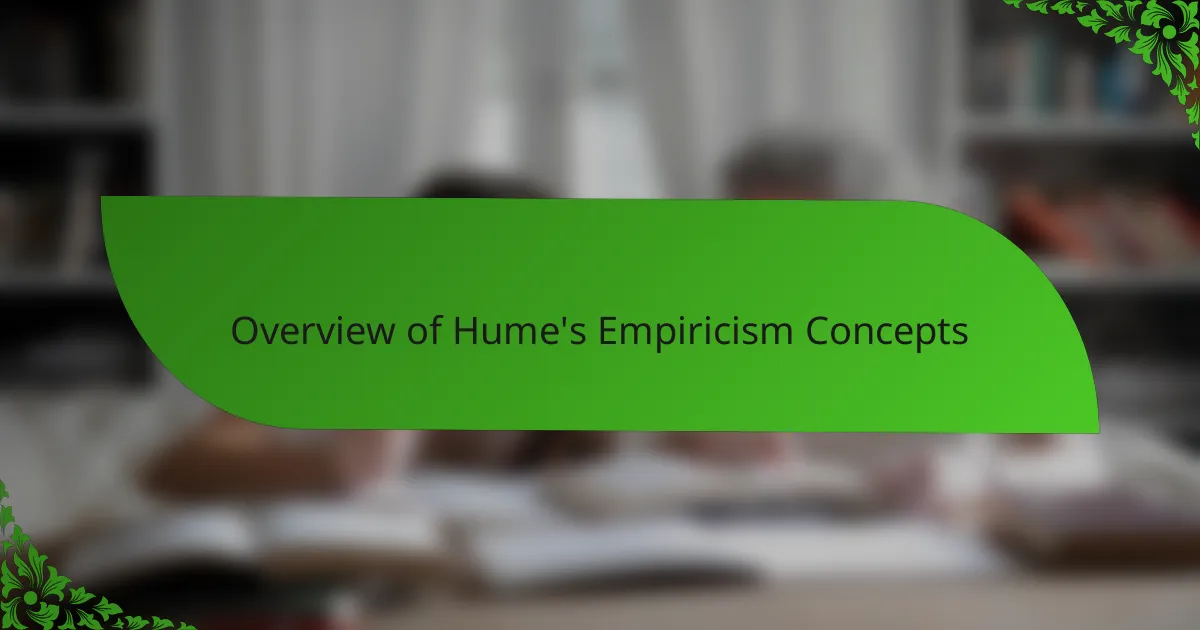
Overview of Hume’s Empiricism Concepts
When I delve into Hume’s empiricism, what strikes me most is his insistence that all ideas originate from sensory impressions. It’s like he’s saying, “Don’t trust your wildest thoughts unless you can trace them back to something you actually felt, saw, or heard.” This approach feels both demanding and honest—as if he’s setting a high bar for what counts as real knowledge.
Hume also challenges the way we think about cause and effect, which personally threw me for a loop. He argued that we never truly observe necessary connections, only patterns of events happening one after another. Have you ever watched a series of moments and wondered if what you expect to happen next is really guaranteed or just habitual guesswork? This made me realize how much of what we call “understanding” might just be habit wearing the mask of certainty.
What resonates deeply with me is how Hume embraces human limitations while still fueling curiosity. He doesn’t dismiss knowledge but reminds me that our beliefs are always tentative, shaped by experience and susceptible to doubt. Isn’t that a comforting yet challenging reminder—that learning is an ongoing journey, not a finished product?
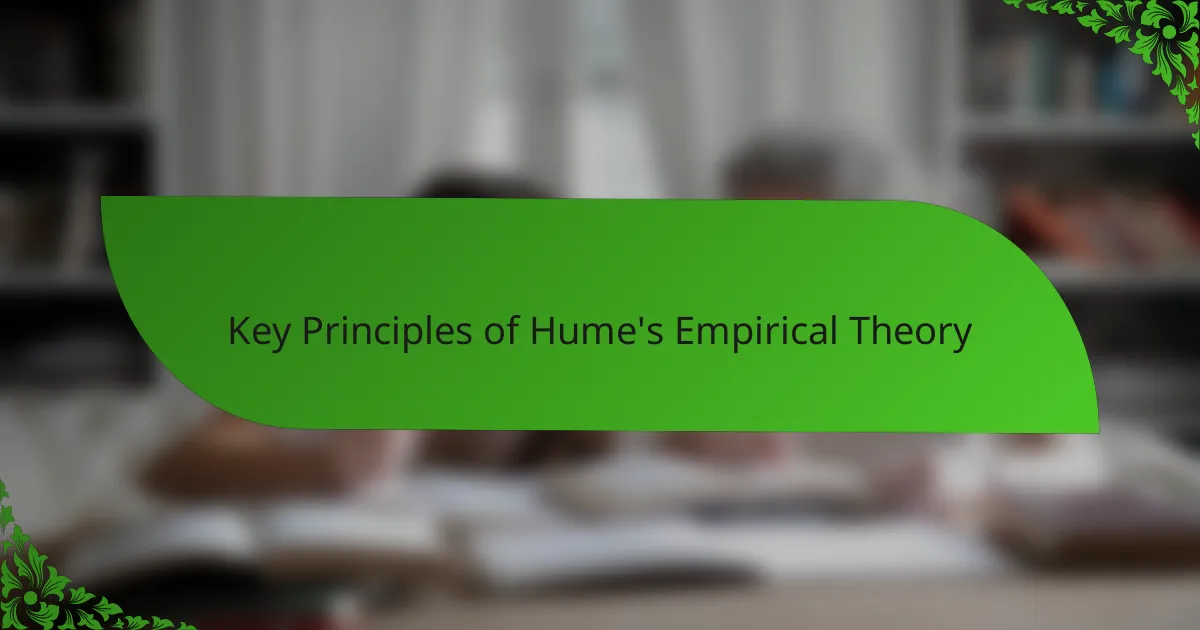
Key Principles of Hume’s Empirical Theory
One of the key principles that really stands out to me in Hume’s empirical theory is his strict distinction between impressions and ideas. He suggests that impressions—the vivid, immediate experiences we get through our senses—are the foundation of all our thoughts. I find this so relatable because, in my own learning, the clearest and most lasting concepts come from what I’ve directly witnessed or felt, rather than abstract speculation.
Another point that caught my attention is Hume’s idea that our minds can only combine or manipulate these sensory impressions; they don’t create entirely new ideas out of thin air. This makes me think about how imagination and creativity are really just remixing pieces of what we’ve already experienced, which feels both humbling and fascinating. Have you ever tried to picture something completely foreign? Chances are, it’s shaped by fragments of your past sensations.
Finally, Hume’s skepticism about causation reveals how deeply he trusts experience over assumption. He asserts that we never observe “cause and effect” directly, only a constant conjunction of events. This principle made me reflect on how much of what I believed as certain was actually built on habit or expectation. Doesn’t it make you wonder how often we mistake familiarity for truth?
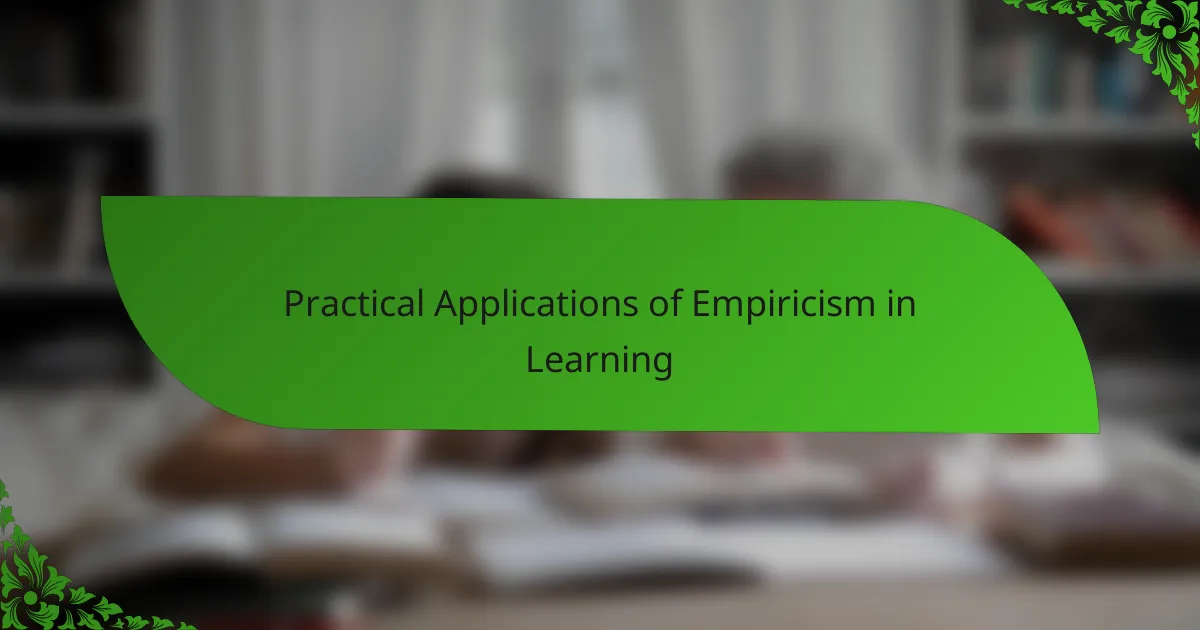
Practical Applications of Empiricism in Learning
When I apply empiricism to learning, I realize how important firsthand experience is for truly grasping a concept. Reading about a scientific experiment is one thing, but conducting the experiment myself—observing, measuring, and adjusting—turns abstract ideas into concrete knowledge. Have you noticed how lessons stick better when you’re actively involved rather than passively receiving information?
Empiricism also encourages me to question assumptions in learning environments. Instead of accepting textbook definitions at face value, I try to test them against my own observations. This process makes learning feel more dynamic and personal, almost like detective work. Isn’t it empowering to rely on your own senses and experiments instead of just trusting authority?
From my experience, empirical learning fosters curiosity by inviting us to explore and verify. When I approach a topic with the mindset that knowledge comes from experience, I stay open to surprises and new evidence. This makes learning an exciting and evolving adventure, rather than a fixed set of facts to memorize. How do you think adopting this approach could change the way we teach and learn?
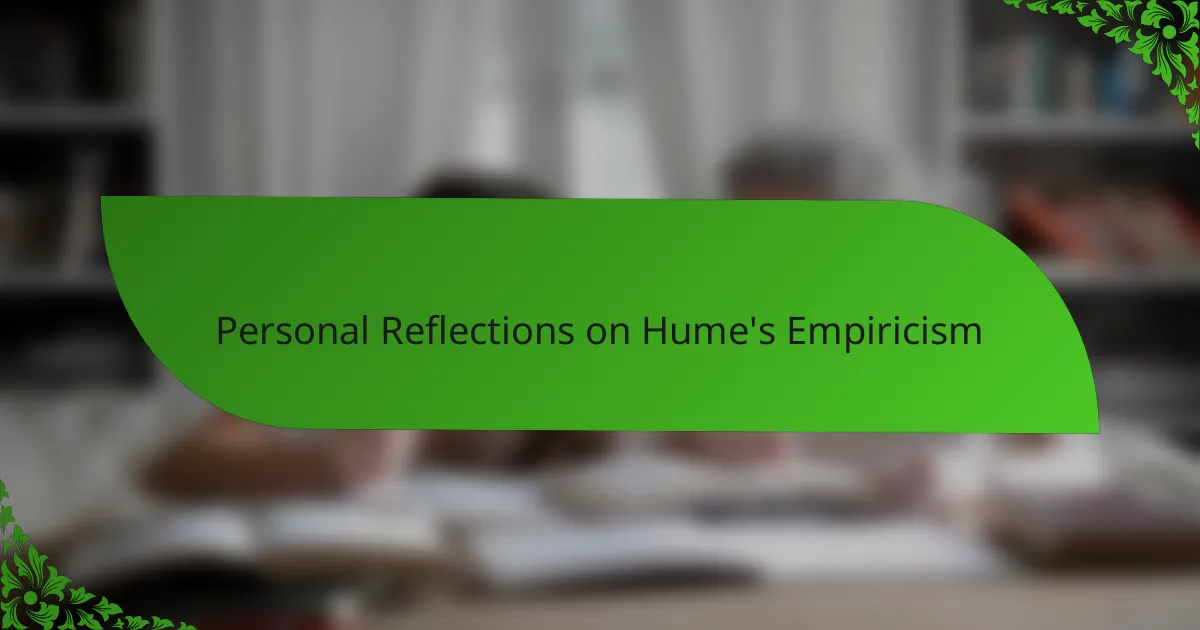
Personal Reflections on Hume’s Empiricism
Reflecting on Hume’s empiricism, I find myself both challenged and inspired. His strict requirement that all ideas stem from sensory experience seems to demand a kind of intellectual humility that I think we desperately need today. Have you ever caught yourself assuming you “know” something deeply, only to realize that belief rests on shaky experience or hearsay? That moment of doubt felt like a breath of fresh air to me—it pushed me to question what I take for granted.
At the same time, Hume’s skepticism about causation hit me personally. It’s unsettling to acknowledge that even cause and effect might not be as certain as I once believed. I recall a time when I assumed a routine outcome would follow from a specific action, only to be proven wrong. This experience made Hume’s point concrete: our minds create stories to make sense of patterns, but those stories aren’t guarantees. Doesn’t that make you rethink how confidently you approach everyday expectations?
Ultimately, what resonates most with me is Hume’s recognition of our human limits contrasted with his spirited curiosity. His empiricism feels like an invitation to embrace uncertainty rather than fear it—an encouragement to keep learning, observe closely, and remain open-minded. Isn’t this mindset essential not just in philosophy, but in life itself? For me, adopting that kind of curiosity has made even mundane moments richer with possibility.
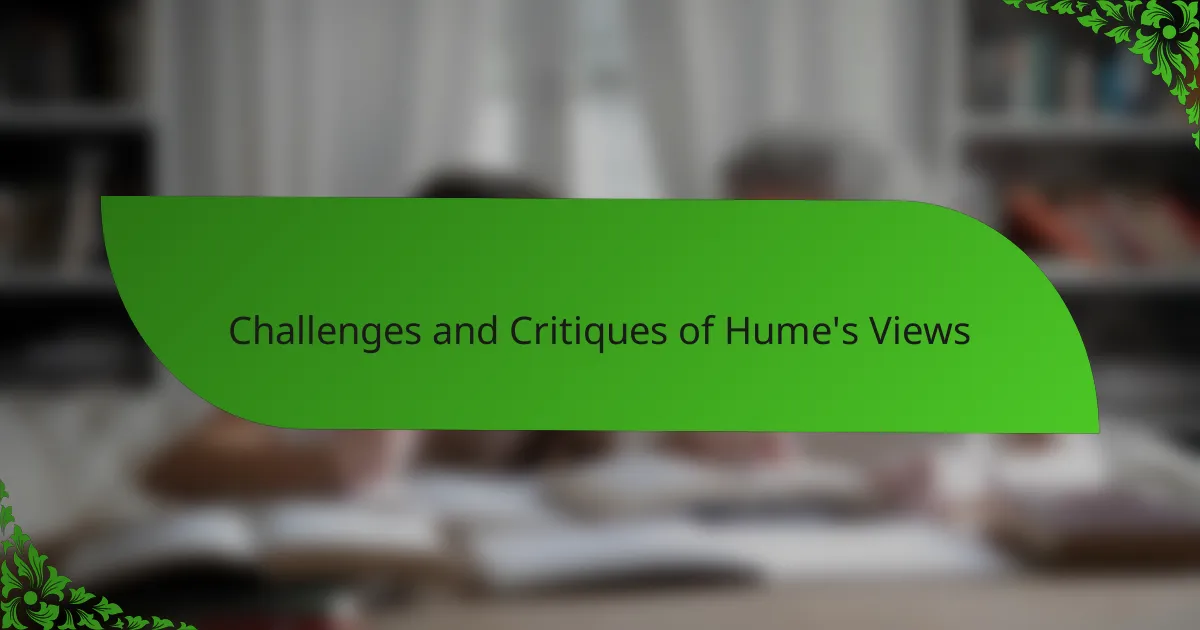
Challenges and Critiques of Hume’s Views
Hume’s empiricism, while compelling, isn’t without its critics, and I’ve often wrestled with some of these challenges myself. One major critique that struck me is how his strict reliance on sensory experience seems to dismiss the role of imagination and abstract reasoning. I wonder, can all knowledge truly be traced back to direct impressions, or are there ideas that transcend what we immediately perceive? This question left me uneasy, as it feels like Hume’s framework might limit the richness of human thought.
Another challenge that I find particularly thought-provoking is Hume’s skepticism about causation. His claim that we never observe necessary connections but only constant conjunctions throws a wrench into how we understand scientific laws and everyday reasoning. I remember moments when I trusted cause and effect implicitly—only to realize those connections were assumptions built on habit. Doesn’t this make you question how much of our “knowledge” is just repeated expectation rather than certainty? For me, it underscores the fragility beneath what feels like solid ground.
Finally, I can’t help but reflect on the implications of Hume’s views for knowledge beyond experience. Some argue his approach leads to a kind of intellectual pessimism, where we’re stuck doubting everything. From my perspective, while this can feel frustrating, it also invites a kind of humility and openness I find refreshing. Rather than seeing it as a barrier, I choose to view it as a call to keep questioning and exploring, even when answers aren’t guaranteed. How might embracing this uncertainty change the way we engage with knowledge in our own lives?
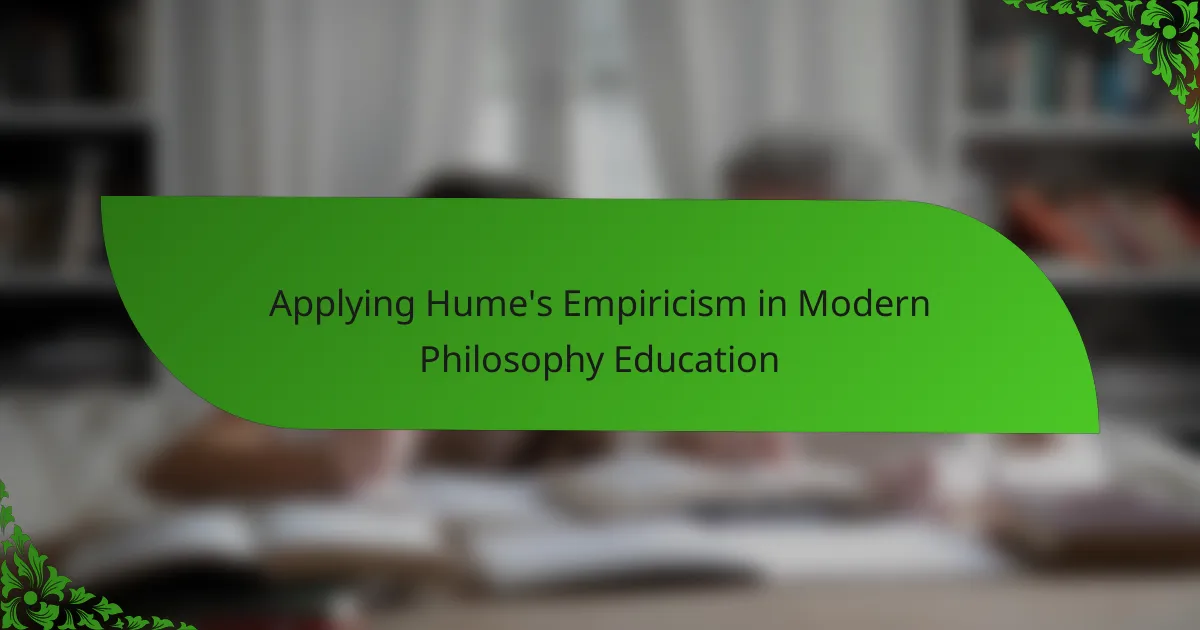
Applying Hume’s Empiricism in Modern Philosophy Education
Applying Hume’s empiricism in modern philosophy education means placing experience front and center in how we teach and learn. I’ve noticed that when students actively engage with real-world examples and sensory data, their understanding deepens—and abstract concepts stop feeling so distant. Have you ever seen a lesson come alive when learners encounter the idea firsthand rather than just reading about it?
Incorporating Hume’s emphasis on evidence and skepticism encourages learners to question assumptions rather than accept information passively. From my experience, this creates a classroom atmosphere that’s more curious and critical. Isn’t it refreshing to see students not just memorize but investigate and verify claims themselves?
Yet, applying Hume’s empiricism also calls for balancing sensory learning with the acknowledgment of its limits. I’ve found it important to remind learners that while experience grounds knowledge, it doesn’t capture everything—encouraging them to remain open to doubt and ongoing inquiry. How might our teaching change if we embraced this humility alongside the pursuit of evidence?